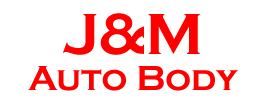Choosing the Right Repair Facility Can Be A Matter of Life or Death
Your automobile is most likely one of your largest single investments. If you’ve had the misfortune of having an accident, you don’t want to leave your vehicle in the hands of just any “body man”. If you’re shopping for a quality collision repair center, you don’t need to be a collision repair expert to know what to look for. You may want to watch for certain features which indicate that a business takes pride in the service it performs.
The parking area should be neat and clearly marked, with ample parking space for customers and insurance company representatives.
The office should be clean and well organized with a restroom and a comfortable seating area for customers. Employees in the office should be clean, neatly dressed and unconditionally courteous.
The shop should be well organized and well equipped with state of the art frame repair equipment. The most modern collision centers are now equipped with digital measuring systems which combine computer and laser technology to measure and pinpoint damage in your vehicle’s frame and structure.
If your vehicle is still drivable, you may want to schedule an appointment in advance to drop it off for repairs. This will allow the shop a few days to order any necessary parts so you won’t have to wait for them later. At this time, it is also a good idea to contact the insurance company that will be covering the cost of the repair to let them know what shop you’ve chosen and to ask any last questions you might have. If your vehicle was towed from the accident scene, most shops will arrange to have it moved to their facility. If your vehicle was towed to a repair facility, you are not under obligation to have it repaired at that same facility. As the owner of the vehicle, you are free to choose the collision repairs facility that you want to trust with your vehicle.
Remember that your insurance company cannot legally insist that you use a certain repair facility even though they may suggest shops where they’ve had acceptable quality repairs done in the past. However, you may or may not want to accept the insurance company’s recommendation as they have been known to send customers to the shop that gives them the lowest prices on acceptable quality repairs.
Remember, the insurance adjuster’s job is to satisfy the customer at the lowest possible cost to the insurance company. Another point to remember is that the insurance company’s recommended shop may tend to cut a few corners in the repair process to make up for the discount they are giving the insurance company. Although the insurance company’s recommended repair facility may be consistently producing acceptable quality repairs, there very well may be better quality facilities in your area so it’s important to shop around. You’ll also want to keep in mind that most insurance adjusters are not collision repair experts, regardless of what they claim.
Before dropping off the vehicle, it will be a good idea to remove personal belongings or anything of value. Even though all the employees may be very honest people, they often remove interior parts to gain access to the damaged area or to protect the interior from damage. One misplaced item can cause a lot of hard feelings. Also, most collision shops carry insurance to cover damages to your vehicle as a result of fire, theft, or even employee carelessness, but this insurance will only cover the vehicle and its factory installed parts. Finally, one of the most common customer complaints of the decade is about melted CD's, tapes, video tapes, floppy discs and even candy. Modern collision shops are equipped with ovens used to bake fresh paint and speed the drying time. While twenty minutes at 180 degrees Fahrenheit won’t harm your car, it will destroy some of the things that people often keep in their cars.
If a rental car is provided by the insurance company, you may want to arrange to have the rental car delivered at the time of your appointment. In most cases, your vehicle will have to be left in the shop for several days or longer and it's usually a good idea to secure an alternate means of transportation for a few days longer than you expect to need it.
Modern vehicles’ frames and structures are being built into single units, called unibodies. Unibody vehicles are designed to absorb the impact of a collision so that passengers will receive a lesser blow from the impact. In the process of absorbing the impact, the vehicle often sustains damages that are overlooked upon the first inspection of the damage. When you add the modern equipment such as power windows and door locks, air bags, etc., you increase the possibility of overlooked damages. Overlooked damages can drastically effect the safety and handling characteristics of your vehicle so it is very important that ALL damages are located and repaired.
Once inside the shop, your vehicle’s damaged area should be disassembled for a careful re-inspection. Any additional damages should be reported to the insurance company immediately. If the insurance company representative insists on re-inspecting the damage, the repair process could be delayed for up to 2-3 days. In turn, any additional damaged parts must be ordered which may lead to another delay, depending on availability. Additional delays can also result from disputes between the repair facility and the insurance company. Insurance companies often try to refuse coverage of certain operations which are required in order to properly repair the vehicle. When the shop refuses to perform those operations that were denied, the vehicle is often left sitting in the shop while the dispute is settled. Also, the insurance company may insist that "aftermarket" of “QRP” parts be used for the repair.
